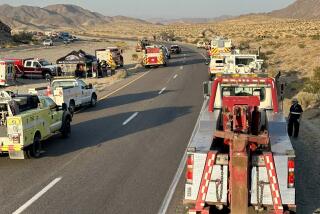CHP Inspection Puts Brakes on Unsafe Bus Trips
- Share via
BAKER, Calif. — Claire Karamian had visions of slot machines, blackjack tables and buffets when she and 46 other gamblers boarded a chartered bus in Glendale at 5:30 a.m. Saturday and headed for a weekend in Las Vegas.
It was going to be a hell of a deal--$15, round trip, including a hotel room Saturday night.
They just didn’t count on spending 1 1/2 hours at a hot and windy rest stop in the Mojave Desert, between here and the Nevada state line, after their bus was ordered off the road by the California Highway Patrol.
It would be one of eight charter buses “red-tagged” by the CHP Saturday morning as unsafe for travel, nabbed at a surprise safety checkpoint along Interstate 15 where 59 buses were inspected.
This particular bus was cited because a right rear wheel was cracked; if it worsened at freeway speeds, no telling what would have happened.
Karamian was steaming, and not just because of the heat.
“I told the driver something was wrong,” she complained, searching out shade until the wheel was replaced. “I thought I felt something.
“This was the first time I’ve taken one of these--and it’ll be the last time,” she pledged. “I would have rather paid $30 for a better bus.”
But she didn’t blame the CHP for her 90-minute delay in getting to Sin City. “It’s a good thing, to make sure these buses are safe,” she said. “We don’t want to die.”
That’s precisely the point of these safety checkpoints--the second conducted in the past six weeks by the CHP.
During the last weekend of June, out of 112 buses that were inspected, 87 were cited for one violation or another, and 36 were ordered “out of service,” meaning they either had to stay at the rest stop until repairs were made, or were allowed to proceed to their destination with the promise that repairs would be made before the return trip home. When the CHP inspects northbound buses on a Saturday, it also sets up an inspection station that night and the next to re-inspect returning buses and make sure that the work has been done.
Among the most dangerous problems in June: a front wheel with seven of its 10 lug nuts so loose they were in danger of falling off, leaving inspectors wondering whether the bus would have reached the state line without losing its wheel.
The driver of another bus was cited because he had a suspended license.
On Saturday, fewer serious violations were found, and that pleased the CHP.
“Maybe the last time we were out here, we made our point,” said Officer Manny Landeros. “That’s the whole idea.”
Besides the cracked wheel, the other most serious violation was a loose steering ball joint. “That’s about the worst thing you can have go wrong--to lose your steering,” said CHP Officer Greg Wilks. “The passengers won’t be happy about the delay until it’s fixed but, oh well. Hopefully they can understand why we’re doing this.”
Indeed, the travelers seemed to take it in stride, as repair parts were sent from Riverside.
“As long as the CHP is checking, we know we’re safe, and we’d rather be safe than sorry,” said Perscilla Olvera, who organized one of the trips.
Said one of her passengers, Art Carrillo: “I’m glad to see the inspections, but it’s too bad that there was something wrong with our bus.”
Other problems found Saturday included cracked windshields, minor oil and compressed air leaks, poorly adjusted brakes, inoperative brake lights and turn signals, and incomplete driver’s logs. If the problems did not immediately jeopardize the safety of the passengers, the buses were allowed to continue to their destination after the drivers signed “fix-it tickets,” promising to make repairs later.
Not surprisingly, it is the older buses that tend to have the most violations, CHP officers say; some have been on the road since the 1950s.
Hundreds of bus companies--and thousands of charter buses, ranging in value from $25,000 to $500,000--operate in Southern California, said Sgt. Chuck Cooper.
Typically, day trips to the state line casinos are organized by individuals who keep whatever they charge of the passengers--say, $5. The bus company is paid by the casino to deliver gamblers. One driver said his company receives $900 for each busload of gamblers it brings to the state line casinos, and $1,400 for each load brought to Las Vegas.
The gamblers are then enticed to gamble at that casino because of coupons and other premiums that must be redeemed at different hours throughout the day.
So for gamblers, chartered buses are considered a cheap way to get to Nevada--assuming the bus can make it.
Charter buses are inspected annually by the CHP at their terminals. But because those visits are scheduled--and the buses are preened in advance--the surprise freeway inspections are considered more telling of a bus’ roadworthiness.
Some of the inspectors’ favorite stories from over the years:
* The bus with such poor brakes, it couldn’t slow down in time to make the off-ramp into the inspection area, locked its brakes and skidded to a stop on the freeway.
* The inspector who got off a bus holding the steering wheel in his hands.
* The bus that had lost its luggage compartment door; no telling how many items had fallen out along the way.
More to Read
Sign up for Essential California
The most important California stories and recommendations in your inbox every morning.
You may occasionally receive promotional content from the Los Angeles Times.










